During the course of 45 years there have been well over 225 stories of Doctor Who. By this point most shows would have fizzled out and diminished. What is it that makes Doctor Who one of the few exceptions? Perhaps it’s because of the fact that the show has an almost infinite crop for the plots to blossom. After all, one episode will have the mysterious time/space traveler and his friends on an irradiated planet in the future. Next thing you know we’re in the dark ages. Like The Doctor himself, this show is not bound to one planet or one time. Heck, it’s not even bound to the same universes. Just imagine, forty-five years of adventures into the unknown.
But some adventures have a bigger impact compared to others. Some stories have molded the evolution of the series and have constantly moved the show in a variety of different directions. For this segment of our month-long 45th anniversary celebration, Fandomania will be spotlighting some of the most definitive episodes which, in one way or another, have established Doctor Who as one of the most versatile shows on television.
25) The Girl In The Fireplace
A tragic and bittersweet tale which has absolutely no problem with illustrating the curse of a Time Lord’s lengthy lifespan. It shows why The Doctor could never stand to stay with his companions forever. Director Euros Lyn injects this story with a sort of elegance and subtlety, which is essential to the story’s resolution.
24) Dalek
Though the Daleks are Doctor Who’s most celebrated monster, they have always been the focus of much mockery. This episode destroys all of that in one fell swoop. Stairs are no longer an obstacle, bullets are totally useless, and the plunger has more uses than a Swiss army knife. This episode is also a pivotal stepping stone as it gives us our first real taste of what happened during the Time War.
23) Earthshock
This story has become a quintessential milestone on multiple fronts. Firstly, it introduces the new and improved variation of the Cybermen. More importantly, this story became an important chapter in the legacy of a Doctor Who companion. Adric has always been a much derided companion, but that doesn’t stop us from being shocked by the sudden nature of his death. It was a sobering reminder of the dangers that The Doctor faces in his travels. Just because you travel with The Doctor, it doesn’t mean you’re invincible. Adric’s death still resonates through the history of the show and is a constant reminder to us all as we see the current companions skirt death on multiple occasions.
22) The Impossible Planet / The Satan Pit
A terrifying tale which combines the claustrophobic atmosphere of Alien with the psychological terror of The Exorcist. The new series’ first venture onto an alien planet is an unrivaled success. The production design is right on the money, and the story is loaded with fantastic moments of gut-wrenching tension and gripping drama. We also get a peek into what The Doctor truly believes in. Another bit of brilliance embedded in this story is how, despite The Doctor’s defeat of “The Beast”, there still is that foreboding feeling of the unknown. The are still questions left by the episode which may never be answered. Nor do we want them to be.
21) The Talons of Weng-Chiang
Trailer created by Stuart “BabelColour” Humphryes
This is one of Robert Holmes’ definitive masterpieces. A frightening, atmospheric mystery combining such polar elements as Chinese illusionists, ventriloquist’s dummies with homicidal tendencies, Victorian London, giant rats, and fugitives from the future with unwavering ease. This also features one of Tom Baker’s more collected performances in which he is less of the eccentric jester and more of a serious presence who never lets you forget that this is not a pleasant state of affairs.
20) The Daleks (The Dead Planet)
The only thing that was equally pivotal to Doctor Who‘s debut is the debut of The Doctor’s greatest enemy, The Daleks. The first appearance of The Daleks became the first real declaration of the show’s impact. This story was Doctor Who‘s first visit to an alien planet, its first alien race, and its first major success on the British airwaves. On the merit of this seven-part serial, Dalekmania took all of Britannia by force, and very soon ratings skyrocketed and the groundwork was laid for the decades to come.
19) The Curse of Fenric
This is one of the most dramatically satisfying entries of the McCoy era, and McCoy and Aldred really show why The Seventh Doctor and Ace were an infallible combination in this terrifying WWII horror story. Espionage conspiracies between the Russians and the British take a back seat to the horrifying revelations regarding Ace’s past and how she came to travel with The Doctor. This story also shows a side of The Doctor that is guaranteed to have audiences shaking their heads with shock as they witness how far The Doctor is willing to go to fight the good fight.
18) The Mind Robber
A remarkably versatile story of the Troughton era. It begins as a foreboding psychological thriller and then it deftly transitions into a fun spirited adventure into a world of fiction where The Doctor, Jamie, and Zoe meet Gulliver, Rapunzel, and D’Artagnan. They also run into dangerous fictional creatures like the Minotaur and Medusa. The Mind Robber is an early example of how Doctor Who is a show that can literally go anywhere–even to places that aren’t meant to exist.
17) The Mark of the Rani
One thing that BBC dramas do very well is period pieces, and “Mark of the Rani” is no exception. What really makes this episode a classic is that it effectively uses the Industrial Revolution as the setting for a clash between The Doctor, his old nemesis The Master, and the amoral Time Lord geneticist The Rani. The Rani establishes herself in this story as another great villain in the making. Her presence combined with her no nonsense attitude make for a villainess that we should have seen more of. This episode is also a worthy mention because in this one Colin Baker was finally starting to act past the horrible duds he was forced to wear.
16) Father’s Day
Everything has its time, and everything dies. Rose Tyler learns this the hard way in this doozy of an episode which illustrates some hard consequences and hard decisions which come with time travel. Even with the flying temporal predators and time loops, this is hardcore human drama at its finest. It never holds back the emotion, but it never beats it over your head. Plus it reinforces how far Doctor Who has come as a TV show to actually allow for the human drama to upstage the spectacle.
15) Vengeance On Varos
Definitely one of the most controversial episodes of the classic series. This episode caused a massive uproar with the parents and the censors because of its shockingly violent content. What the puritans didn’t grasp is that the violence is part of the story. Writer Philip Martin invokes a dark, satirical world where torture and execution is a form of entertainment to keep the locals happy while they work for a pittance in the mines of Varos.
14) Ghost Light
In the final year of Doctor Who, Script Editor Andrew Cartmel brought a new crew of writers on board. One of them was Marc Platt. For his one and only contribution to the series, Platt delivers one of the most mind-bendingly complicated stories of the show’s history. “Ghost Light” is a macabre, gothic tale about a mysterious house from Ace’s past. This story feels like an episode of Dark Shadows injected with a touch of that Doctor Who charm. It also features some extremely strong performances from McCoy and Sophie Aldred, aided in no small part by an extremely sharp supporting cast. The story is rich with philosophical depth and intrigue, and it is definitely an essential focus of discussion of the McCoy era.
13) The Enemy Within (The TV Movie)
A valiant attempt by both the BBC and FOX to resurrect the series. Even though the story is questionable, the film is still rife with defining moments for Doctor Who. We see the Doctor’s controversial first kiss as well as the brilliant steampunk production design of the TARDIS, and we finally get to see what Doctor Who would look like on a grander scale. On top of all this, Paul McGann shows remarkable potential as The Doctor. Tragically this was his only performance on film as The Doctor. Thank god for Big Finish.
12) Enlightenment
The Black Guardian Trilogy concludes with a breathtaking spectacle, and a one of a kind story, involving a race throughout the cosmos with spaceships that look like period sailing ships. The episode also introduces the Eternals, a race which become a staple of the series’ mythology. This episode also holds merit concerning the evolution of The Fifth Doctor’s companion Turlough. He began his travels with The Doctor as an unwilling assassin. By the end of this story he becomes much more.
11) An Unearthly Child
This first episode was included in this list for one simple reason: It set everything in motion. All it had to do was keep asking questions that we would continue asking for the next four and a half decades.
10) Blink
Even though The Doctor barely appears in this episode, his presence is felt all throughout this white-knuckle, nightmare-inducing spine-tingler. Writer Steven Moffat and Director Hettie MacDonald go beyond typical horror movie tactics and give us a Doctor Who horror story to rival some of Hitchcock’s best work.
9) The Stolen Earth / Journey’s End
This two-parter concludes the thirtieth series, and it closes the series with style. This story is a total compilation of the past four series and encompasses the ever expanding Who-niverse by seamlessly crossing over with its two spin-offs, Torchwood and The Sarah Jane Adventures. Writer Russell T. Davies pulls off the Herculean feat of giving adequate screen time to the massive ensemble and simultaneously gives a brand new face to the Daleks’ creator Davros. Davies completes his reign as head writer by wrapping up every loose end and delivering a companion departure that can only be described as tragic.
8) City of Death
A story that lives and breathes the beauty of Paris and the brilliance of the works of Leonardo DaVinci while simultaneously delivering one of the cleverest stories in the show’s history. Aided by some of the most quotable dialogue of the Tom Baker era, Baker himself delivers one of the most vivacious performance of his tenure. The story also benefits from an outstanding supporting cast and a alluringly devious villain played with sophisticated relish by Julian Glover.
7) The Time Warrior
A triple threat episode. Firstly it’s an excellent period story, effectively blended with an alien invasion scenario. Secondly, it introduces the Sontarans, who would go on to become a fan favorite amongst the menagerie of Who Monsters. Most importantly, this story also gives us another fan favorite with the debut of Sarah Jane Smith, the companion who went farther than any other companion had ever gone. Sarah Jane moves from traveling companion to an intergalactic hero on par with The Doctor.
6) School Reunion
Whatever happened to Sarah Jane? In this episode we find out. It is in the act of finding out that we discover what makes this one so important. It’s the first episode that actually talks about life after travelling with The Doctor. What happens when you try to get back to ordinary life when you know there’s so much more out there? We also get a real glimpse into The Doctor’s loneliness and the origin of said loneliness.
5) The Empty Child / The Doctor Dances
The BBC has always been proficient in period dramas, but this is a period drama on an epic scale with Chula Warships, Omnisexual con-artists, and terrifying children in gas masks. This episode cemented the new series’ reputation as a haven for creativity and innovation. The way the episode coolly juggles human drama, chilling science fiction suspense, and playful humor is a triumph of writing and direction.
4) The Invasion
This story puts The Doctor’s other nemeses, The Cybermen, in the spotlight and provides us with some truly iconic imagery which still holds up this very day. It also boasts some of Patrick Troughton’s finest moments as The Doctor. This episode also provides us with a fantastic debut of UNIT, led by The Doctor’s longtime friend, Brigadier Alistar Gordon Lethbridge-Stewart.
3) Inferno
Despite the length, this is an consistently intense story, which handles the seemingly redundant, universe hopping subplot with chilling ease and balances it with a double “race against time” scenario. Pertwee finishes his first series with total authority in the role and establishes himself as a one-of-a-kind Doctor. Many of the other regular cast member also get a chance to stratch their acting legs by also playing parallel version of themselves.
2) The Caves of Androzani
Aside from the fact that it is, hands down, the best swansong story for a Doctor, “Androzani” is also a tightly woven tale of betrayal and revenge. The story is directed with action movie precision by Greame Harper, who would later become one of the best directors on the new series. The story is briskly paced, and all of the performances are played to the hilt. Particularly Peter Davison gives the performance he has always wanted to give as The Doctor.
1) Genesis of the Daleks
Trailer Edited by Stuart “BabelColour” Humphryes
In the years preceding this episode, we always wondered what made the Daleks tick. In this story we meet the man who made the clock. We discover that even The Doctor has conflicts and that sometimes it may be best to let things ride. Terry Nation hit his zenith with this episode. He finally gave a method to the madness of the greatest threat in the universe.


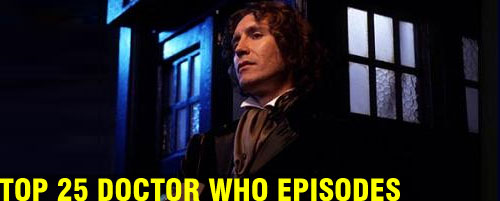


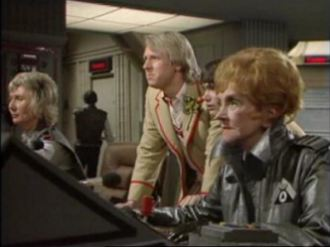
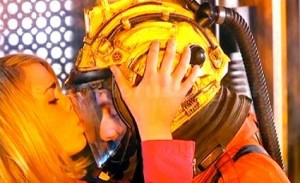

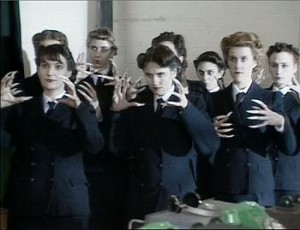
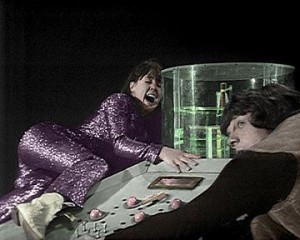
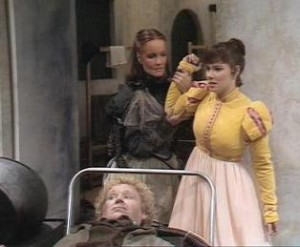

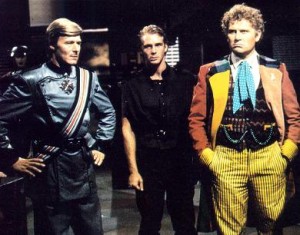

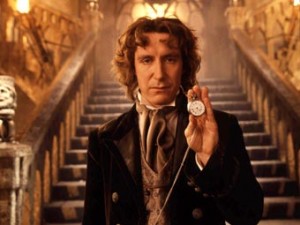
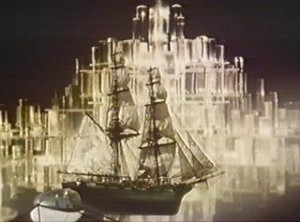
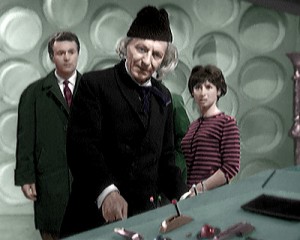
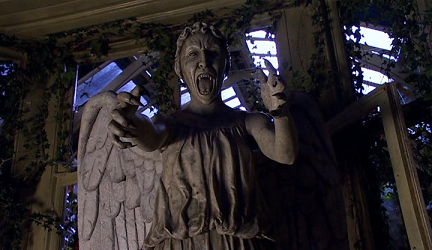

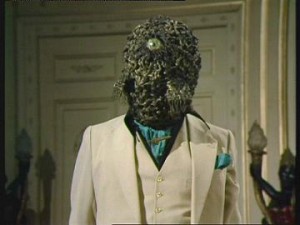
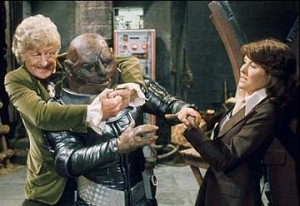
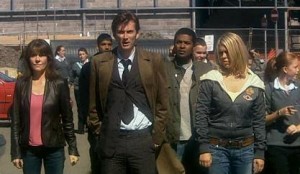
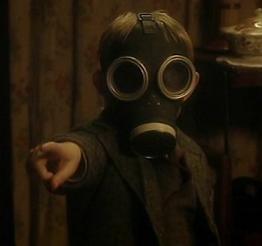
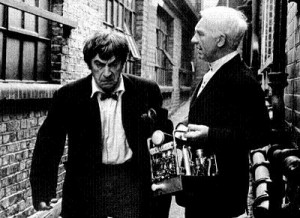
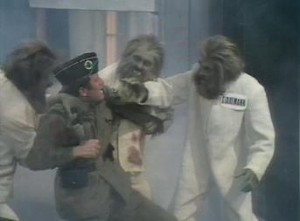
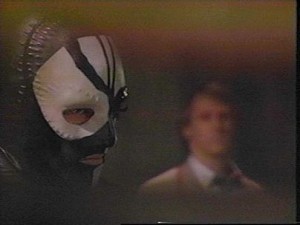




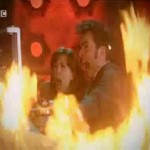
Pingback: The Great Geek Manual » Geek Media Round-Up: November 13, 2008
Pingback: Getting started with Doctor Who: ten episodes « paulgorman.org/blog
Pretty sure Genesis Of The Daleks sets the events of the time war in motion too. Just sayin.
Great list. One major gripe. No Pyramids of Mars?!
That’s top 5. Not outside top 25, surely?
You’ve missed The Tenth Planet! A vitally important story that introduces the Doctor’s ability to switch to a new actor..er… appearance. Without this concept, the series wouldn’t have left the sixties.
Your synopsis of City of Death omits the important detail that this story was written by the late Douglas Adams.